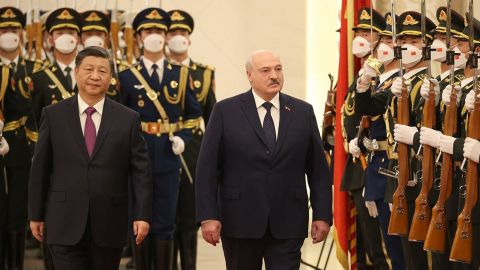
Hong Kong
CNN
—
Chinese leader Xi Jinping met with Belarusian counterpart Alexander Lukashenko – a close ally of Vladimir Putin – on Wednesday, in a state visit that comes as the West raises concerns that China could be drawing closer to Russia – by considering providing lethal aid for Putin’s war in Ukraine.
Xi greeted Lukashenko in Beijing’s Great Hall of the People on Wednesday for their first face-to-face meeting since the two leaders upgraded ties to an “all-weather comprehensive strategic partnership” on the sidelines of the Shanghai Cooperation Organization (SCO) summit last September in Uzbekistan, which Putin also attended.
“Today we will jointly set out new visions for the development of the bilateral ties … Our long-lasting friendly exchanges will keep our friendship unbreakable,” Xi told Lukashenko during the meeting, according to Chinese state media.
The visit from the Belarusian leader – who allowed Russian troops to use Belarus to stage their initial incursion into Ukraine last year – comes as tensions between the US and China have intensified in recent weeks, including over concerns from Washington that Beijing is considering sending lethal aid to the Kremlin’s struggling war effort. Beijing has denied those claims.
The meeting came a day after US Secretary of State Antony Blinken on Tuesday made some of the most direct comments to date about how the US would respond to any lethal support China supplied to Russia.
Blinken warned Washington would target Chinese firms or citizens involved in any effort to send lethal aid to Russia for its war in Ukraine, while speaking during a visit to Kazakhstan. He said later he had no plans to meet with Russian or Chinese counterparts at a G20 meeting for foreign ministers scheduled to take place in New Delhi in India on March 2.
Beijing – which claims to be a neutral party in the conflict – has pushed back on the US implication it is considering sending lethal aid. Its Foreign Ministry on Monday said China was “actively promoting peace talks and the political settlement of the crisis,” while the US was “pouring lethal weapons into the battlefield in Ukraine.”
Beijing last week released a 12-point position on the “political solution” to the crisis in a document calling for peace talks to end the year-long war. Xi reaffirmed China’s stance on the conflict to Lukashenko, according to a Chinese readout of the meeting.
“China’s paper on the political solution to the Ukrainian crisis has been released,” Xi said. “The core of China’s position is to promote peace and talks. We must stick to the direction of political settlement, abandon all Cold War mentality, respect the legitimate security concerns of all countries, and build a balanced, effective, and sustainable European security architecture.”
Xi added that, “relevant countries should stop politicizing and instrumentalizing the world economy and do things that help to cease fire and war and resolve the crisis peacefully.”
According to the Chinese readout, Lukashenko said the Belarusian side “entirely agrees with and supports China’s position and proposition on a political solution to the Ukrainian crisis, which is significant to resolving the crisis.”
Its release, however, was criticized by Western leaders, who accused China of already having taken Russia’s side. Reacting to the meeting between Xi and Lukashenko, Blinken said China “can’t have it both ways,” “putting itself out as a force for peace in public” while it “continues to fuel the flames of this fire that Vladimir Putin started.”
He added that there are “some positive elements” of China’s peace proposal but cautioned, “if China were genuinely serious about this, the very first principle that put out sovereignty, it would have been spending all of the last year working in support of the restoration of Ukraine’s full, full sovereignty.”
Blinken accused China of doing the opposite of supporting peace in Ukraine “in terms of its efforts to advance Russian propaganda and misinformation about the war blocking and tackling for Russia.”
Lukashenko also met with Chinese Premier Li Keqiang on Wednesday and called for the two countries to “intensify” their relations, according to a readout from the Belarusian government.
“We have no closed topics for cooperation. We cooperate in all avenues. Most importantly, we have never set ourselves the task of being friends or working against third countries,” Lukashenko told Li per the readout.
The tightening of ties between Minsk and Beijing comes alongside a years-long decline in Belarus’ relations with the European Union and as it may seek to diversify its Russia-dependent economy.
The former Soviet state was targeted by sweeping sanctions from the US and its allies in response to Moscow’s aggression after Lukashenko allowed Russian troops to invade Ukraine through the 1,000-kilometer (621-mile) Ukrainian-Belarusian border north of Kyiv.
The European Union also does not recognize the results of Lukashenko’s 2020 election win – which sparked mass pro-democracy protests in the country and were followed by a brutal government crackdown.
There have been fears throughout the conflict in Ukraine that Belarus will again be used as a launching ground for another Russian offensive, or that Lukashenko’s own troops would join the war. Before visiting Moscow earlier this month, Lukashenko claimed there is “no way” his country would send troops into Ukraine unless it is attacked.
Both China and Belarus have previously implied that the US does not want to see an end to the conflict.
In comments to reporters earlier this month before heading to Moscow to meet with Putin, Lukashenko maintained he wanted to see “peaceful negotiations” and accused the United States of preventing Ukrainian President Volodymyr Zelensky from negotiating.
“The US are the only ones who need this slaughter, only they want it,” he said.
Beijing has made similar assertions, with China’s top diplomat Wang Yi saying at a security conference in Munich earlier this month that China does not “add fuel to the fire,” and is “against reaping benefits from this crisis,” alluding to regular Chinese propaganda messaging that the US is intentionally prolonging the war to advance its own geopolitical interests and increase the profits of its arms manufacturers.
CNN’s Martin Goillandeau and Sandi Sidhu contributed reporting.

